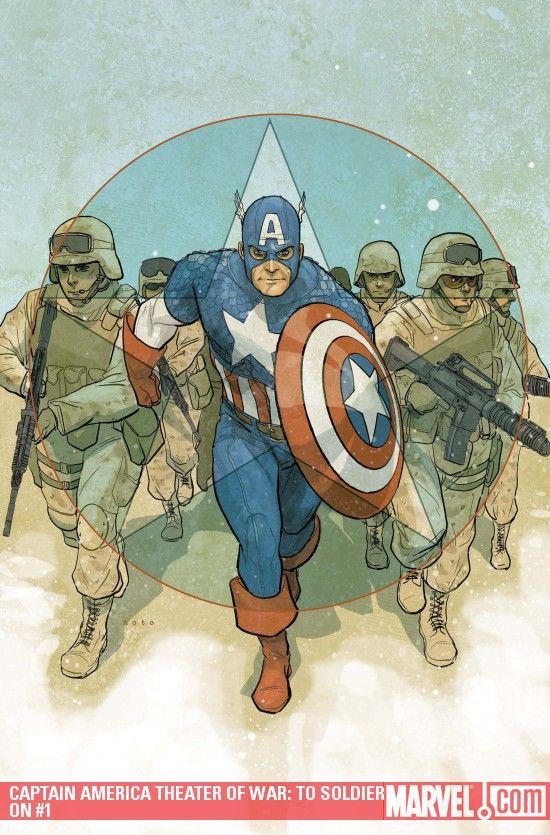I had assumed all of these "Theater of War" comics would be about Captain America's interactions with the soldiers of World War II. That's not the case at all, though, as this issue so dramatically demonstrates.
Here, Paul Jenkins and Fernando Blanco give us a one-shot tale of Captain America in Iraq, and though you might imagine absurd sights like Steve Rogers socking Saddam Hussein in the jaw, we don't get anything of the sort in this issue. One of the things Jenkins and Blanco do so well is make Captain America seem like a super-soldier, not a superhero. There aren't any dramatic angles of Cap leaping through the air, no dynamic knock-out punches, no five-carom shield tosses. Instead, we see Captain America running like a normal man -- a little silly looking, in his red, white, and blue costume -- into danger, and then commanding the troops respect through his direct and effective actions.
But this isn't Captain America's story at all. It's the story of Sgt. Anderson, the soldier who once tried to give Captain America a high-five in the middle of Baghdad. That high-five -- a high-five left hanging as Cap rushed back into action -- becomes the centerpiece of this issue, as Sgt. Anderson recounts the story again and again, and it comes to symbolize what this issue is about: the awkwardness of the relationships between men in combat, and the innocence of a simple high-five in the middle of deadly situations.
For Sgt. Anderson, that failed high-five was the worst, most embarrassing (but funny, even for him) moment of his entire first tour of duty in Iraq.
When he returns for a second tour, things get a lot worse.
Iraq isn't the same when he comes back. Captain America isn't the same. The squad takes on a special mission to work with the patriotic hero, escorting him as he visits with local mullahs and sips tea. It's a strange war, and soon Sgt. Anderson gets caught up in events that are far more painful than a failed high-five. And Captain America is partially to blame for what happens to him.
The rest of the story takes a darker turn, and then verges on sentimentality at the end, but Jenkins and Blanco provide such a deep sense of humanity here that it doesn't feel maudlin. In other words, this single issue is far more successful than the entire "Captain America: The Chosen" miniseries.
The title of this comic is ridiculously long, and the idea of Captain America in Iraq is equally ridiculous (isn't he supposed to be off fighting other superheroes in some kind of Civil War, or traveling through time in his brain?), but this issue tells a powerful -- if familiar -- story about war, duty, struggle, memory, and forgiveness. It's good.

